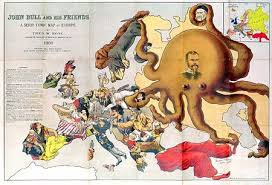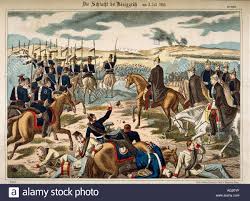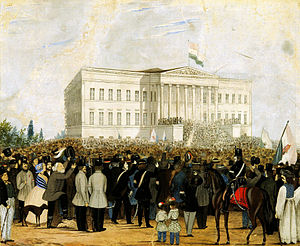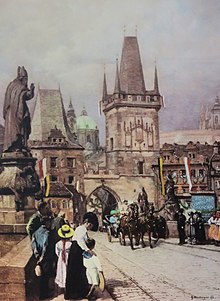Chapter 46 East versus West
"Nicholas that bastard! I will make sure to teach him not to interfere with our unification and show him the true might of Germany! Russia will forever regret the day they crossed a Hohenzollern."- Kaiser Wilhelm I 1847
"Those Russians never learn do they. After fighting a war over Germany they still want to goad us into further conflict. It matters not. To Crimea!"- Queen Victoria 1852
"If Germany, Austria, and Russia all fight each other who wins? Poland!"- unknown Polish peasant 1847
During the first half of the First War for German Unification, if there was one factor that the Germans deeply regret missing it was that of Russia. While Russia was indeed a close ally of both nations due to the Holy Alliance, Kaiser Wilhelm had been hoping that Nicholas would stay out of this fight since there would be no direct benefit for Russia and Wilhelm had proved that he was still willing to help with the status quo when he crushed the Polish Uprising in Posen. This was not good enough for Nicholas since he could not risk the rise of another Napoleon to power, with Germany's alliance with Britain being put forward it seemed like the best solution possible to put Germany in its place before it dominated the continent while Britain worked in unison to cut off Russian Expansion in the Great Game. For Nicholas it was a war for survival so that he could finally prove that the might of the Russian could trump over that of the West and their revolutionary ideals. For Germany it was a fight for the Fatherland and to keep the ideas of the Revolution for their new Empire after they had fought so hard to realize their dream of unification. Two civilizations would clash in 1847. This being the beginning of a grand feud that would last until The Great War, where only one would survive.

Texan political cartoon showing the chaos of Europe during the Revolutions
East Germany: Eastern Germany while not the most industrious, economically productive, or resourceful area, was in many ways a heart of the German Empire as it is the land where the Teutonic Order was born and where the modern state of Prussia rose from Brandenburg. As such, during the campaign in Austria there were still 300,000 men that were stationed here throughout the war in case the Russian's tried something or Austria somehow managed to defend its empire and begin a counterattack into Prussia. Therefore will some men were sent to the front lines in Austria to replace battlefield losses, there was still quite a force to be reckoned with in East Prussia. The Russian's plan to counter this problem was to send 150,000 men under Lieutenant General Yegor Tolstoy to go and take the old Prussian capitol of Konigsberg. When making their way to the city the force moved at a slow rate on purpose in order to have the Germans focus all their attention on capturing the city. Within days the port city of Memel fell before the Prussian force and they had reached the Pregel river on June 22nd. Making their way across it and reaching Konigsberg on June 24th. During this time the German Army under General Heinrich Ludendorff spent its time organizing and preparing to meet the Prussian onslaught before it made its way any further into the fatherland. The two armies clashed on June the 26th with the battle lasting for a full day with the Russians charging at the Prussian lines multiple times while providing non-stop artillery fire and cavalry charges. The Russians were told not to rest and kept on charing at the lines the whole time with even the reserves taking action, forcing Ludendorff to keep his troops from creating a flanking maneuver. At the end of the day the Russian army retreated from the city and headed south, leaving over 11,000 German casualties to the Russian's 15,000. At first Ludendorff thought that this was Tolstoy simply retreating before his army could be crushed by the full weight of the German force. It wasn't until later that he found out that it was all a ruse as the main Russian army of over 200,000 led by Prince Alexander Menshikov had been taking the time to make a thrust deep in the center of Eastern Prussia with the distraction in the North and the German obligations in the South providing his troops a way to go unopposed. For the first month the main part of the Russian army virtually steamrollled through Posen by managing to take most of the Grand Ducy by the coming of August. At the same time the Northern army was reorganizing and shifted focus to Danzig in order to take out the much more valued German Port while Russian reinforcements would soon be able to come and one day capture Konigsberg.
The Germans weren't doing nothing though as at the same time Ludendorff managed to reclaim the rest of Eastern Prussia and was redirecting his army to contain the Russian advance before it reached the Baltic, he was able to do this with some success as the Battles of Tuchel and Rosenberg were German victories and kept the Russians from advancing farther north. Down south it would be said to be the opposite as the Russians were advancing as far west as they could. The main opposition that the Russians had faced at that point was a group of German militias, Polish farmers, and German reinforcements from North of 68,000 men where they had tried to stop the Russians at the battle of Posen on July the 17th. The battle lasted for an entire week as the German defenders fought valiantly to contain the Russian onslaught and most often had to resort to close quarters combat within the city while Russia was able to contain them in using their cavalry. The battle was a failure as the Germans were defeated with over 30,000 casualties while the Russians suffered 23,000. It was successful in a strategic sense though as the Russians had taken massive attrition and had to slow down their progress. The farthest that Russia had been able to advance forward was all the way to the Oder River by September where everything below the 53 North in Germany belonged to Russia. They would have advanced further but by this time reinforcements had arrived from the French Border, Bohemia, and from Britain with their professional armies being shipped in. The total end of the Russian offensive was confirmed with the battle of Frankfurt on August 17th where a man Russian force of 100,000 troops under the command of Prince Menshikov tried to take the city but found themselves faced by a superior force of over 250,000 troops with most of them being reinforcements from other theaters. When the Russians launched their first attack their charge was slaughtered as over 10,000 Russians were either dead or wounded after the first charge, after that the German/British army counterattacked and forced the Russian army back 10 miles with Russia taking around 12,000 more casualties while Germany and Britain took a total of over 11,000. Realizing that his plan was lost, Menshikov then ordered his army to fortify their positions nad secure their territories. All the while coming under heavy resistance from Polish Partisans while the Anglo-German alliance prepared to strike back.


Reinforcements from the west arrive (Right) Battle of Frankfurt (Left)
Austria: At the time of May 22nd the Austrian Empire looked like it was about to collapse and that Germany would gain a whole new Archduchy for its territory. Now these dreams would be crossed as Prussia was now under attack and the conquest of Austria was now a secondary objective compared to saving the Empire that was so fragile at the moment. When Field Marshall von Multke heard of Russia's "stab in the back" he knew that the thrust could no longer be made against Vienna with a unilateral German force. So with some extreme reluctance, Multke had to order the 3rd Army under Stoffenburg to only reinforce them with two divisions while the main force continued its trek up North to join Ludendorff and the main Prussian reinforcements. In the meantime the 1st Army would have to get reinforcements from local Nationalists or volunteers from Germany. With the capitol now longer having the possibility of being besieged by a far numerically superior force, Franz-Joseph could now focus on maintaining the siege as long as possible and securing any other parts of the empire that he could with available forces. Now that Hungary was now longer on its borders, reinforcements were now flowing in from Galicia as tens of thousands of troops came west with some going to the sieges of Prague and Vienna, while others went down south to mop up any forces that the 3rd Army left behind. gradually retaking much of Slovenia and some of Southern Austria over a period of time. In Bohemia Field Marshall Siegfried von Lohengramm was affected the most as he had to send the most amount of manpower to the North with his forces being the closes ones to provide aid. He now had to send over 100,000 troops to Prussia while the rest were either committed to Prague or securing Western Bohemia. The Czechs were able to take advantage of this by using reinforcements from Galicia along with some men stripped from Prague to commence a campaign in coordination with the Russians to take back Silesia, which they did by July 29th. Realizing that the more important battles were going on in Prussia or in Austria. Field Marshall Lohengramm chose to break off the siege on August 3rd and commit his men to defending the borders and all of Bohemia west of the Vlatava. With the siege now ended the Czechs attempted to attack the Germans in the Second Battle of Prague on August 6th, unfortunately for them Lohengramm's superior tactical skill was able to hold the line and prevent the Czechs from making any incursions into his force while they were pushed back to Prague. Resulting in over 6,000 German casualties and 7,500 Czech casualties. Lohengramm then went off with the 1st and 2nd Division of his forces while leaving command to General Fredrick Muller. Lohengramm's intent was to head east and create a cut in Czech lines to prevent as many men from reinforcing Vienna as possible. He was successful as the city of Brno was captured on August 23rd with its defenders of 5,000 quickly surrendering when surrounded. For the rest of the war Siegfried Lohengramm would use the city as a FOB to commence hit and run tactics around the region to buy the main German forces enough time to strike back and continue the conquest.

Field Marshall Siegfried von Lohengram and the 2nd Army heading East.
Navy: Perhaps the greatest blessing of the Anglo-German alliance of the war can be pointed to the British contribution to the German's naval supremacy in the war. While Germany's were not needed at the beginning, it wouldn't have done much alone as Prussia had a skeleton fleet and the best ships of the nation belonged to the former Hanseatic States which were in small quantities. At first the Russian Baltic fleet made a move to blockade Germany by sending its troops all around the coast all the way to Denmark. This was successful for the first month but its effects were minimal with the North Sea side of the nation still receiving shipping. The blockade wouldn't last for long as the main British Home Fleet of over 100 ships led by Admiral William Stanford headed to the Baltic to face off against the Russian force of 25. In July the entire Baltic Sea became a virtual turkey shoot for the British since while Russia had upgraded some of its ships to steam, the British Home Fleet was all entirely built around steam and had some capitol ships with twelve inch guns. By August the blockade was virtually eliminated and Britain was able to send over much supplies along with 200,000 men in the German Expeditionary Force (GEF). Further down south in the Mediterranean the British were having a harder time trying to quell Russian power in the Black Sea as most of their forces were either in Britain, the colonies, or in America at the moment. There were only 40 ships in the whole Mediterranean around Egypt and Russia had around 60 in the Crimean Peninsula. Everytime the Royal Navy entered the Dardenelles they would exit Turkish waters hours later and come under heavy fire by awaiting Russian convoys. Those who did manage to escape would wonder the Black Sea for weeks without any friendly ports to go to, until they turned back to Constantinople or would get destroyed by the Russians. All that this had achieved in the end was Britain to lost 14 ships while Russia had lost only 3. The only good that came out of the region for the British was the fact that they were able to reinforce a blockade of the Austrian held shores with only 10 ships from the Mediterranean. More ships would arrive with the Oregon War dying down but the Black Sea would remain Russia's lake for now.


Royal Navy ship in action at the Baltic (Right) Russian Navy hunting British ships in the Black Sea (Left)



